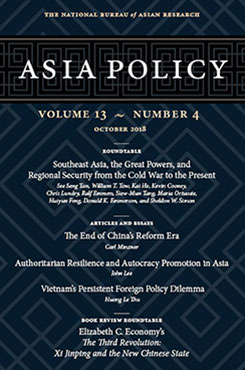Understanding Authoritarian Resilience and Countering Autocracy Promotion in Asia
This article examines some of the reasons for authoritarian resilience and democratic erosion in Asia and assesses options for countering autocracy promotion to create more realistic conditions for democratization in the future.
EXECUTIVE SUMMARY
MAIN ARGUMENT
Proponents of modernization theory postulate that rapid economic growth in Asia will lead to the emergence of independent and politically active middle classes agitating for democracy in the region. Although Asia continues to enjoy rapid economic advances, democratization has stalled, and in some instances, has gone backward. The reality is that many regional countries take a deeply embedded instrumentalist or pragmatic view of democracy and remain unconvinced about the inherent virtues of universal suffrage. At a time when democracy is on the defensive, China has emerged as a regional and global leader in promoting the apparent virtues of authoritarian approaches and the supposed weaknesses of democracy. This increases the importance and urgency of countering China’s anti-democratic narrative so as to create more fertile ground for democratization to take root in Asia.
POLICY IMPLICATIONS
- Proponents of democracy must abandon the complacent view that democracy will be the inevitable destination for rapidly growing economies in Asia and accept the reality that China is leading an authoritarian offensive in making the case that one-party rule is a better model for many countries in the region.
- Democracies need to enter this debate and contest over ideas and adapt their message to the regional audience. If established democracies seek to create more fertile ground for democratization, they need to better counter Chinese narratives.
- Rather than simply promoting the virtues of universal suffrage (which might not in and of itself lead to superior results in some countries), democracies need to focus on building practical institutions that increase accountability, transparency, and protections for the rights of individuals and entities in countries undergoing political transitions.
John Lee is a Senior Fellow at the Hudson Institute. He is also an Adjunct Professor and Nonresident Senior Fellow at the United States Studies Centre at the University of Sydney. From 2016 to 2018, Dr. Lee served as senior national security adviser to the Australian foreign minister.
About Asia Policy
Asia Policy is a peer-reviewed scholarly journal presenting policy-relevant academic research on the Asia-Pacific that draws clear and concise conclusions useful to today’s policymakers. Asia Policy is published quarterly in January, April, July, and October and accepts submissions on a rolling basis. Learn more


